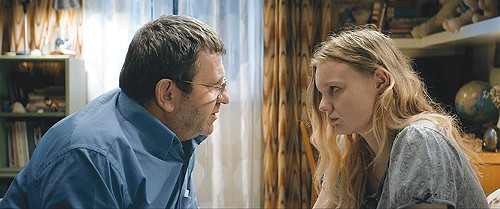Morality Play
Romanian drama Graduation digs into a flexible sense of ethics.
By Scott Renshaw @scottrenshawFew things make for more compelling drama than moral choices, and—hey, where's everybody going? Come back!
Herein lies the dilemma when trying to talk about some of the most talented creators of international cinema, like Romanian director Cristian Mungiu: The subjects that drive their work lead many potential viewers to check out mentally. Whether it's the filmmakers like Mungiu in the Romanian New Wave, or Iran's Asghar Farhadi, or any of 100 other great artists, when storytellers dig into why people do sometimes indefensible things, no giant spacecraft are hovering menacingly above big cities. Moral drama is a tough sell.
Graduation finds Mungiu, as he did in his previous sensational works 4 Months, 3 Weeks and 2 Days and Beyond the Hills, exploring how people in post-Ceausescu Romania are still negotiating the country's often-corrupt institutions in a way that allows them to retain their dignity and humanity. The story follows a surgeon named Romeo Aldea (Adrian Titieni) in the city of Cluj. He's focused his entire life on the prospects of his daughter, Eliza (Maria Dragus), who is about to graduate from high school. Eliza is on the verge of earning a scholarship to attend Cambridge in England, requiring only the completion of her final exams. But on the day before she takes them, she is sexually assaulted—and Romeo, worried that a distracted Eliza might not achieve the required scores, begins exploring, shall we say, ethically creative ways of ensuring high marks.
Mungiu builds Romeo as a fascinating protagonist from Graduation's opening scene, in which a rock thrown through his apartment window sends him on a furious quest to find out who was responsible. That sense of having the moral high ground—being the one who finds bad guys, rather than being one—erodes as Romeo eventually seeks out a government official named Bulai (Petre Ciubotaru) who needs a new liver, and might be able to pull a few strings for Eliza's exams if Romeo is able to move him up the list of potential transplant recipients. Romeo has also been carrying on a matter-of-fact affair with a neighbor, a single mother named Sandra (Malina Manovici), while remaining in a dead-in-all-but-name marriage to his wife, Magda (Lia Bugnar). When Romeo earnestly refuses Bulai's offer of cash as a thank-you, it's clear that he still considers himself an honest man, even as Mungiu shows the many ways he has already compromised his integrity.
That character study is part of an equally intriguing peek into the machinations of a Romanian society that's built on handshake deals, bribes and gaming the system. Conversations refer to funeral directors paying off ambulance drivers for tipping them off about casualties; Eliza's boyfriend, Marius (Rares Andrici), matter-of-factly tells Romeo about the allowances granted to the athletes at his high school. "Everyone cheats" Romeo says at one point, rationalizing his own behavior because it will allow Eliza to have a future away from this culture of graft.
If there's a frustration in Graduation, it's that Mungiu is better at establishing the broad strokes of his scenario than he is at filling in the details. The reasons behind the disintegration of Romeo and Magda's marriage remain curiously fuzzy, making it harder to get a sense for how culpable Romeo is in his infidelity. There's also a strangely unresolved subplot in which Romeo believes he has evidence that Marius was a witness to the attack on Eliza, but failed to help her, and a seemingly pointless tangent involving the health problems of Romeo's elderly mother. An overall narrative drift diminishes the impact of the most tension-filled confrontations and slows the momentum of Romeo's dilemma as his plan unravels.
Yet, there's ultimately a powerful notion embedded in the naturalistic filmmaking of Graduation: What are parents really teaching their children about how to be a "good person"? As Romeo cares for Sandra's son one day at a playground, and the boy is caught throwing rocks at another child, Romeo tells him that's not how people behave. "How should I behave?" the boy replies; and it's obvious that Romeo has no idea what to tell him. Parental platitudes inevitably collide with the choices real people make every day. That's the kind of morality play that should be harder to ignore.
More by Scott Renshaw
-
Feature film review: THE BEAST
A filmmaker's compelling ideas get a bit tangled in references to his creative influences.
- Apr 17, 2024
-
Faces of Salt Lake County book and portrait reception
Images and personal stories in a new book reveal local demographic diversity
- Apr 17, 2024
-
Film Reviews: New Releases for April 12
Civil War, Escape from Germany, Coup de Chance, Hundreds of Beavers, La Chimera, Sting
- Apr 11, 2024
- More »
Latest in Film Reviews
Readers also liked…
-
Power Plays
Two satirical comedies explore manipulations and self-delusions by those with power.
- Aug 31, 2022




